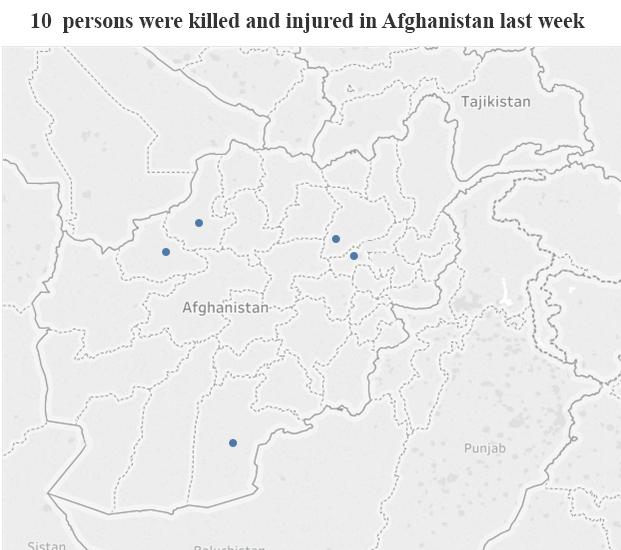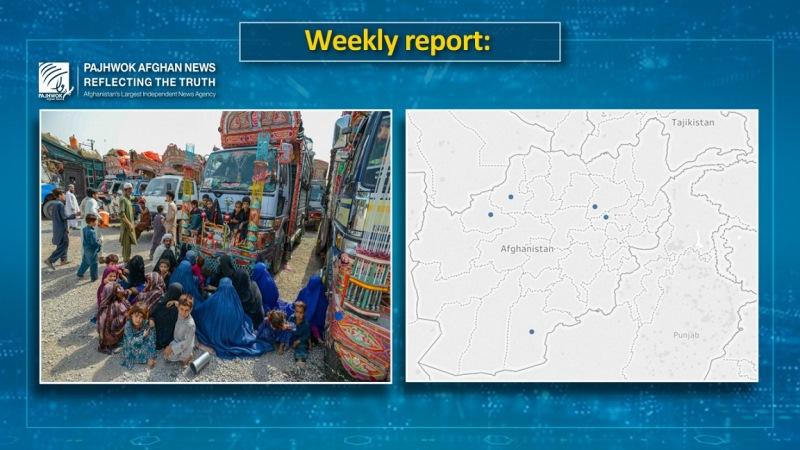KABUL (Pajhwok): Pakistan’s decision to evict one million undocumented Afghan refugees drew widespread criticism last week, when the Asian Development Bank (ADB) announced 400 million dollar grant for Afghanistan.
Last week’s major events
- Pakistan’s decision to evict refugees widely criticized
- Muttaqi stresses increased trade ties among regional countries
- ADB announces $400m grant for Afghanistan
Casualties
Last week, five people were killed and as many others injured in separate incidents of violence nationwide.
Unknown gunmen killed a young man in Badghis and an elderly man in Kandahar. A man shot and killed a male nurse at a private hospital in Faryab before injuring himself and a dead body was found in Parwan.
A man killed his mother in Kapisa and injured three other people.

Note: These figures are based on reports reaching Pajhwok Afghan News. Some incidents may have gone unreported or sources have provided incorrect figures.
In the previous week, six people had been killed and nearly a dozen more injured in various incidents across the country.
Before the regime change in 2021, hundreds of civilians, insurgents and security forces would get killed and wounded every week.
Pakistan’s decision to expel Afghan refugees criticized
Pakistani police have started arresting Afghan refugees since last three weeks and have so far arrested more than 1000 refugees, including about 400 who possess legal documents. However, those having documents were released.
The Afghan embassy in Islamabad has said the bodies of four Afghans had been found in hospitals and other places.
The corpses were found days after Pakistani police arrested 1,000 undocumented Afghan refugees in the last two weeks.
In a statement, the diplomatic mission deplored despite frequent promises from Pakistani government, police continued harassing Afghan nationals.
The Amnesty International has asked Pakistan to stop its crackdown on Afghan refugees because a forced return to Afghanistan could put them at grave risk.
Pakistan has ordered all undocumented immigrants, including 1.7 million Afghans, to leave the country by November 1, vowing mass deportations for those who stay.
The UN refugees agency (UNHCR) and the International Organisation of Migration (IOM) have urged Pakistan to continue protection of all vulnerable Afghans who have sought safety and could be at imminent risk if forced to return.
The United Nations has expressed concern about Pakistan’s decision to evict undocumented refugees and said no refugee should be forced to leave.
Pakistan’s acting interior minister Safraz Bugti had claimed preparing the plan to evict illegal Afghans in coordination with the Afghan caretaker government, but Islamic Emirate (IE) spokesman Zabihullah Mujahid called Pakistan’s decision unacceptable.
Mujahid said in a statement: “The behavior of Pakistan against Afghan refugees is unacceptable. The Pakistan side must reconsider its plan. The Afghan refugees are not involved in insecurity problems in Pakistan. As long as Afghan refugees return to their country voluntarily, the government of Pakistan should tolerate them.”
Afghanistan acting Defense Minister Maulvi Mohammad Yaqub Mujahid had deplored Pakistan’s decision and called it “barbaric”.
He had asked the Pakistanis to urge their government to reverse the plan and stop brutalizing Afghans.
ADB grant
The Asian Development Bank (ADB) on Wednesday approved $400 million in grants to protect the welfare and livelihoods of vulnerable Afghan people, particularly women and girls.
The support, delivered through the United Nations (UN), will address emergency food needs, enhance domestic food production for medium-term food security, and provide core health services for the Afghan people, ADB said in a statement.
The Expanding Essential Food Security and Health Services Project (Support for Afghan People) will provide off-budget direct financing to three UN agencies, helping to bridge the financing gap for immediate support.
Afghanistan has faced an unprecedented humanitarian crisis compounded by climate change and intense droughts, floods, and earthquakes. An estimated 85% of its population lives below the poverty line.
Mujahid said this kind of decisions deteriorated relationship between the two countries
Ex-president Hamid Karzai has slammed the Pakistan government’s attitude towards Afghan refugees as inappropriate and against the principle and values of good neighbourliness.
In a statement from his office on Friday, the former president said: “The treatment of Pakistani authorities towards the refugees is against the spirit of brotherhood and hospitality the people of that country have shown to Afghans for more than 40 years.”
Pakistan decision against Afghan refugees sparked international condemnation as well.
The UNHCR and IOM have expressed concerns over the forced expulsion of unregistered Afghan refugees and said no refugee should be returned by force.
UNHCR and the International Organisation of Migration IOM have urged Pakistan to continue protection of all vulnerable Afghans who have sought safety and could be at imminent risk if forced to return.
Afghanistan is going through a severe humanitarian crisis with several human rights challenges, particularly for women and girls. Such plans would have serious implications for all who have been forced to leave the country and may face serious protection risks upon return, says the UNHCR and IMO joint statement.
Amnesty International has asked Pakistan to stop its crackdown on Afghan refugees because a forced return to Afghanistan could put them at grave risk.
Amnesty International’s Interim Deputy Regional Director for research in South Asia, Nadia Rahman urged the government of Pakistan to continue its historic support for Afghan refugees by enabling them to live with dignity and free from the fear of deportation to Afghanistan.
Pakistan’s Human Rights Commission also said that forced return of Afghan and their arrest was in violation with human rights law.
Trans Himalaya Meeting
Acting Foreign Minister Amir Khan Muttaqi and his Pakistani counterpart have discussed a range of issues, including the problems of Afghan refugees, on the sidelines of the Trans-Himalaya Forum in China.
Muttaqi and Jilani held exhaustive discussions regarding bilateral relations, trade and the problems of Afghan refugees in Pakistan, the Ministry of Foreign Affairs said in a statement.
Muttaqi warned that negative media outbursts, hindering transit and travel, and mistreating Afghan refugees could adversely affect bilateral relations and economic scenarios for both countries.
According to the MoFA statement, he said such decisions and measures should be taken with deep understanding and thorough consideration.
Muttaqi during his visit to China Sichuan Energy, Investment and Development Company asked Chinese businessmen to invest in Afghanistan’s energy sector.
According to reports Australia provide $1.5 million live-saving assistance while the Asian Development Bank provided $400 million aid to Afghanistan.
This comes that the WB termed Afghanistan’s situation critical and added that despite reduction in conflict 20 million Afghans lived in poverty.
ma/nh







GET IN TOUCH
NEWSLETTER
SUGGEST A STORY
PAJHWOK MOBILE APP